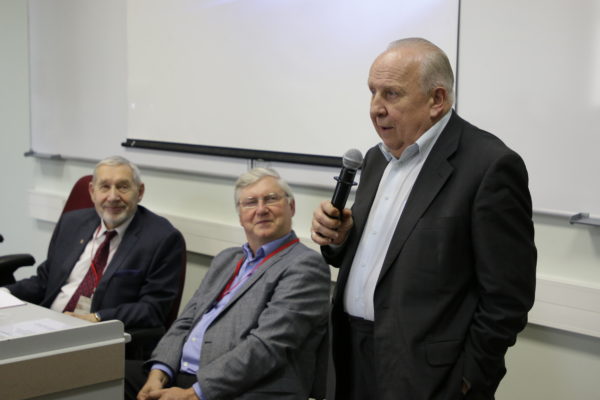
Round table meetings within the International Forum ‘Society. Trust. Risks’ became a platform for discussing migration policy issues at a global level
The State University of Management held the Annual International Forum ‘Society. Trust. Risks: Trust in Migration Processes. Risks of the New Society’. During the forum, experts discussed migration policy regulation mechanisms and global trends in international relations.
After the plenary session, the forum proceeded with a discussion of relevant and pressing issues at round tables, where representatives of public authorities, leading Russian and international experts, PhDs and doctors of science, as well as postgraduates studying international law, migration, human population and riskology discussed the correlation between national and international migration laws, as well as the applicability of the best global practices in this field.
The round tables addressed the issues of the current state of Russian migration policy and national policy; the influence of international labour migration on Russian economy in the context of digitalisation; the applicability of best international practices in the area of labour migration; legal and economic risks of providing migration security in modern-day Russia, as well as the risks of positive net migration rate, etc.
The participants of the round table ‘Legal and economic risks of providing migration security in modern-day Russia’ discussed preferences for the two conventional types of foreign citizens migrating to Russia. The first type represents people with Russian heritage and other Russian-speaking people who intend to live in Russia and are able to quickly and easily assimilate into Russian society. The State Migration Policy Concept prescribes the establishment of the most favourable regimes for resettlement and obtaining citizenship in Russia for this type of migrant. The other type includes people who neither associate their future with Russia or are ready or willing to integrate, however, consider our country as a good place for work, entrepreneurship and the realisation of other legitimate interests. The Concept focuses on the adaptation of such citizens into Russian society, as well as the prevention of risks associated with ethnic conflicts, imbalances in the labour market, criminal behaviour and other negatives.
Doctor of Economics, Professor, Member of the Presidium of the Presidential Council on Interethnic Relations, Chairman of the Commission on Migration Issues and Social and Cultural Adaptation of Foreign Citizens of the Presidential Council on Interethnic Relations, Director of the Institute for Migration of Interethnic Relations Aslambek Paskachev said in his speech: ‘Those migrants who choose to live in Russia, do not want to obtain citizenship for a number of economic, social and political reasons. Despite the fact that these are, logically, our compatriots coming to our country, they do not intend to stay here forever. We need to increase Russia’s attractiveness for migrants, emphasise that the country has enormous potential. At the same time, it is necessary to assess the potential of foreign citizens coming here and attract young people who show great promise’.
During the discussion ‘The current state of Russian national and migration policies: legacy and innovation’, Oksana Yatsenko, Ph.D., Senior Lecturer of the Philosophy Department of SUM also took the stance of supporting young foreign migrants: ‘We need to develop a special project for foreign citizens to create intergovernmental multilateral relations at all educational levels, including universities, technical schools, colleges, etc. The education of migrants should be state-funded. After graduation, foreigners will have to work for a certain period of time to pay off the funds spent on their education. The stay of migrants in the country during this period must be legalised’.
Nikolai Kulikov, Executive Vice President of GPB JSC (Gazprombank), during the round table discussion ‘The influence of international labour migration on Russian economic development in the digital age’ shared his opinion on the implementation of artificial intelligence in Russian companies and banks to reduce security risks: ‘Today, instead of electronic badges, leading companies are actively using biometrics and cameras with face recognition. Biometric contactless identification of a person by face marks a new era in access control and security. At the early stages, innovative solutions can take their toll on budgets. However, looking at such technologies from the point of view of safety and the reduction of future costs, managers are realising that the costs are quickly converted into investments in the future. Such systems will allow the faster tracking and apprehension of persons, including suspects, posing a potential threat to society’.
The discussion platform entitled ‘Risks of economic development in an era of global competition’ discussed the emergence of global trade wars, protection of the rights of free trade between countries, and the imposition of unilateral sanctions. Vadim Saltykovsky, Deputy Chairman of the Committee on Economic Cooperation with Asia and Oceania, Chamber of Commerce and Industry of the Russian Federation, noted: ‘One solution to the situation could be a change in the dispute resolution mechanism and prompt decision-making on judicial proceedings within the WTO. The WTO court takes quite a lot of time to consider legal cases. Therefore, it is important to start developing actual parallel strategies to address such issues without the participation of the WTO’.
All speakers congratulated the staff and students of the State University of Management on the university’s centenary. ‘Each university is the people who study and teach in it. Today, I met many students and young scientists here, and I am very pleased that the younger generation was engaged in this topic. I wish you even more success in the future, and I hope SUM celebrates many more centenaries to come’, said Alexander Chirich, Professor, Doctor of Law at the State University of Novy Pazar (Serbia), Vice President of the Permanent Arbitration at the Serbian Chamber of Commerce of Belgrade, Member of the Board of the Association of Lawyers of the Black Sea and Caspian Regions, Honorary Lawyer of the Russian Federation.
Подпишись на тг-канал "Наш ГУУ" Дата публикации: 8.10.2019
Дата публикации: 8.10.2019





















